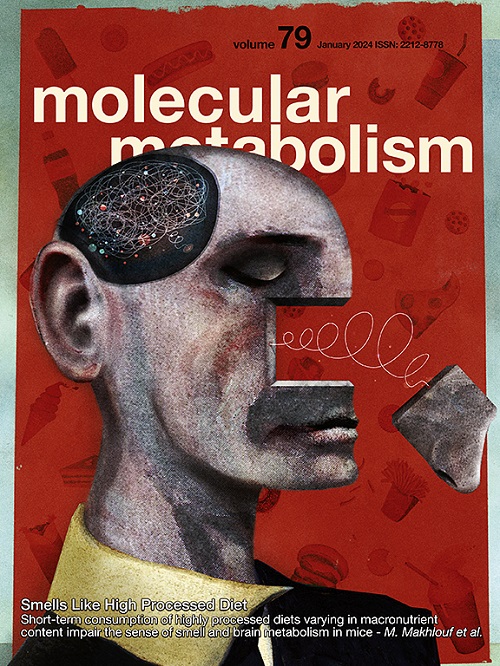Inhibition of pyrimidine de novo synthesis fosters Treg cells and reduces diabetes development in models of Type 1 Diabetes
IF 6.6
2区 医学
Q1 ENDOCRINOLOGY & METABOLISM
引用次数: 0
Abstract
Objective
In autoimmune Type 1 Diabetes (T1D), aberrant immune activation promotes regulatory T cell (Treg) impairments thereby boosting progression of islet autoimmunity. Consequently, there is a progressive destruction of the insulin-producing beta cells in the pancreas. Controlling overshooting immune activation represents a relevant approach to allow for efficient Treg-targeting by broadening the window of opportunity to induce Tregs.
Methods
We investigated the effect of restricting pyrimidine de novo synthesis during islet autoimmunity and T1D by Dihydroorotate dehydrogenase (DHODH) inhibition using the next-generation DHODH inhibitor Vidofludimus calcium. We assessed Treg-inducing features of DHODH inhibition in T cells from ongoing murine islet autoimmunity and human T1D in vitro. To dissect the functional relevance of these observations, we tested the impact of DHODH inhibition on interfering with autoimmune activation and disease progression in pre-clinical models of T1D in vivo.
Results
We show that DHODH inhibition results in enhanced Treg induction in vitro especially during increased immune activation and reduced T cell proliferation. In addition, Vidofludimus calcium reduced T1D incidence in two mouse models. On the cellular level, treated mice showed reduced T cell activation accompanied by increased Treg frequencies.
Conclusions
We demonstrate that restricting pyrimidine de novo synthesis by next-generation DHODH inhibition is a strategy to interfere with autoimmune activation while fostering Tregs.

在1型糖尿病模型中,抑制嘧啶从头合成可促进Treg细胞并减少糖尿病的发展。
背景:在自身免疫性1型糖尿病(T1D)中,异常的免疫激活促进调节性T细胞(Treg)损伤,从而促进胰岛自身免疫的进展。因此,胰腺中产生胰岛素的细胞被逐渐破坏。通过扩大诱导treg的机会窗口,控制过度免疫激活是一种有效靶向treg的相关方法。方法:研究新一代DHODH抑制剂Vidofludimus钙抑制二氢酸脱氢酶(DHODH)对胰岛自身免疫和T1D期间嘧啶新生合成的影响。我们在体外评估了正在进行的小鼠胰岛自身免疫和人T1D的T细胞中DHODH抑制treg诱导的特征。为了剖析这些观察结果的功能相关性,我们在体内T1D临床前模型中测试了DHODH抑制对干扰自身免疫激活和疾病进展的影响。主要发现:我们发现DHODH抑制导致体外Treg诱导增强,特别是在增加免疫激活和减少T细胞增殖期间。此外,Vidofludimus钙降低了两种小鼠模型的T1D发生率。在细胞水平上,治疗小鼠显示T细胞活化减少,同时Treg频率增加。结论:我们证明通过下一代DHODH抑制来限制嘧啶从头合成是一种干扰自身免疫激活同时培养Tregs的策略。
本文章由计算机程序翻译,如有差异,请以英文原文为准。
求助全文
约1分钟内获得全文
求助全文
来源期刊

Molecular Metabolism
ENDOCRINOLOGY & METABOLISM-
CiteScore
14.50
自引率
2.50%
发文量
219
审稿时长
43 days
期刊介绍:
Molecular Metabolism is a leading journal dedicated to sharing groundbreaking discoveries in the field of energy homeostasis and the underlying factors of metabolic disorders. These disorders include obesity, diabetes, cardiovascular disease, and cancer. Our journal focuses on publishing research driven by hypotheses and conducted to the highest standards, aiming to provide a mechanistic understanding of energy homeostasis-related behavior, physiology, and dysfunction.
We promote interdisciplinary science, covering a broad range of approaches from molecules to humans throughout the lifespan. Our goal is to contribute to transformative research in metabolism, which has the potential to revolutionize the field. By enabling progress in the prognosis, prevention, and ultimately the cure of metabolic disorders and their long-term complications, our journal seeks to better the future of health and well-being.
 求助内容:
求助内容: 应助结果提醒方式:
应助结果提醒方式:


